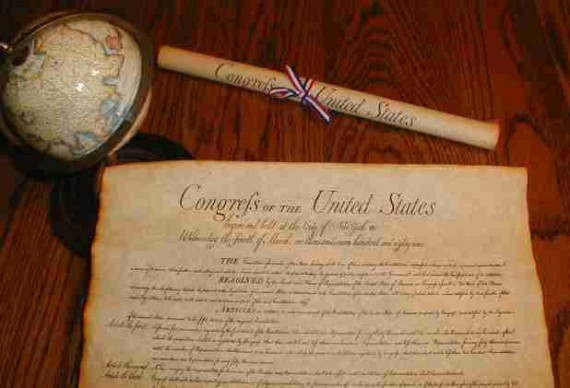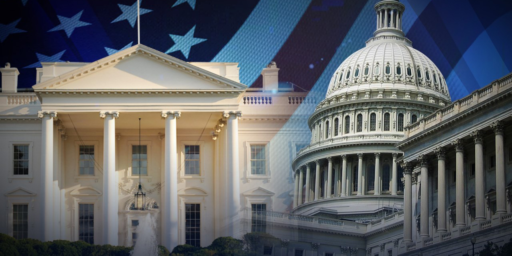Federal Court Rules That NY Times Reporter Must Testify In Leak Investigation
Once again, a Federal Court rules that the First Amendment rules does not protect a reporter from being compelled to reveal sources or the results of an investigation.
The Fourth Circuit Court of Appeals has ruled that a reporter for The New York Times must testify against a CIA employee accused of providing him with classified information that appeared in a 2006 book regarding agency activities during the Clinton Administration:
WASHINGTON — In a major ruling about press freedoms, a divided federal appeals court on Friday ruled that James Risen, an author and reporter for The New York Times, must testify in the criminal trial of a former Central Intelligence Agency official charged with providing him with classified information.
In a 118-page set of opinions, two members of a three-judge panel for the United States Court of Appeals for the Fourth Circuit in Richmond, Va. — the court whose decisions cover the Pentagon and the C.I.A. — ruled that the First Amendment provides no protection to reporters who receive unauthorized leaks from being forced to testify against the alleged sources who leaked to them.
“Clearly, Risen’s direct, firsthand account of the criminal conduct indicted by the grand jury cannot be obtained by alternative means, as Risen is without dispute the only witness who can offer this critical testimony,” wrote Chief Judge William Byrd Traxler Jr., who was joined by Judge Albert Diaz.
Mr. Risen has vowed to appeal any loss at the appeals court to the Supreme Court, and to go to prison rather than testify about his sources. On Friday, he referred a request to comment to his lawyer, Joel Kurtzberg, who wrote in an e-mail: “We are disappointed by and disagree with the court’s decision. We are currently evaluating our next steps.”
Judge Roger Gregory, the third member of the panel, filed a vigorous dissent, portraying his colleagues’ decision as “sad” and a serious threat to investigative journalism.
“Under the majority’s articulation of the reporter’s privilege, or lack thereof, absent a showing of bad faith by the government, a reporter can always be compelled against her will to reveal her confidential sources in a criminal trial,” he wrote. “The majority exalts the interests of the government while unduly trampling those of the press, and in doing so, severely impinges on the press and the free flow of information in our society.”
(…)
The case revolves around material he published in his 2006 book, “State of War,” not in the newspaper. A chapter in the book recounted efforts by the C.I.A. in the Clinton administration to trick Iranian scientists by having a Russian defector give them blueprints for a nuclear triggering device that had been altered with an error. The chapter portrays the operation as reckless and botched in a way that could have helped the Iranians gain accurate information.
In December 2010, a former C.I.A. officer, Jeffrey Sterling, was accused of being Mr. Risen’s source and indicted on Espionage Act charges. His is one of seven leak-related cases brought so far by the Obama administration, more than twice as many as under all previous presidents combined.
The appeals court’s move, which came more than a year after it had heard oral arguments in the case, reversed a ruling by Judge Leonie M. Brinkema of Federal District Court in Alexandria, Va., who had sharply limited what prosecutors could ask Mr. Risen about his sources. She had written that he was protected by a limited “reporter’s privilege” under the First Amendment.
“A criminal trial subpoena is not a free pass for the government to rifle through a reporter’s notebook,” she wrote.
Her ruling was hailed by press freedom advocates as the first time that a judge had quashed a subpoena requiring a journalist to testify about sources in a national-security case. But the Obama administration argued that such a reporter’s privilege did not exist under First Amendment law, and appealed.
A coalition of more than two dozen media organizations, including The Times and Fox News, filed a friend-of-the-court brief in the case arguing that a qualified reporter’s privilege — allowing judges to protect reporters from testifying under some circumstances — was crucial for the “dissemination of news and information to the public.”
On Friday, Judges Traxler and Diaz agreed with the Obama administration that no such protections for reporters exist in federal law.
“There is no First Amendment testimonial privilege, absolute or qualified, that protects a reporter from being compelled to testify by the prosecution or the defense in criminal proceedings about criminal conduct that the reporter personally witnessed or participated in, absent a showing of bad faith, harassment, or other such non-legitimate motive, even though the reporter promised confidentiality to his source,” Judge Traxler wrote.
The majority based its ruling on a 1972 Supreme Court ruling, Branzburg v. Hayes, which rejected an effort by a reporter to avoid testifying before a grand jury. Mr. Risen’s lawyers had argued that the 5-4 ruling was ambiguous and left room open for Judge Brinkema to shield him from testifying in the criminal trial. The appeals court did not agree.
Like the reporter in the 1972 case, Mr. Risen “can provide the only firsthand account of the commission of a most serious crime indicted by the grand jury — the illegal disclosure of classified, national security information by one who was entrusted by our government to protect national security, but who is charged with having endangered it instead,” Judge Traxler wrote. “The subpoena for Risen’s testimony was not issued in bad faith or for the purposes of harassment.”
The court also rejected Mr. Risen’s arguments that it should recognize a common-law reporter’s privilege for criminal cases, as exists in some civil litigation contexts. But even if there were one, the judges said, they would still reverse the district court’s ruling because the government had a “compelling interest” in his testimony; prosecutors have said there is no other way to gain the information they said they needed to convict Mr. Sterling. Its reasoning suggested that even if there were a federal media shield law, Mr. Risen still might be forced to testify.
“Risen is the only eyewitness to the crime,” Judge Traxler wrote. “He is inextricably involved in it. Without him, the alleged crime would not have occurred, since he was the recipient of illegally-disclosed, classified information.”
On some level, the ruling comes as no real surprise. Federal Courts have consistently ruled that reporters have no First Amendment privilege against being compelled to testify regarding the identify of sources, the content of their conversations with those sources, or any other information they may have received during the course of their investigative reporting if they are subjected to a validly issued subpoena. This has been largely the case ever since the Supreme Court decision reference above and, indeed, it has been decisions like the one by Judge Brinkema that was appealed to the Fourth Circuit that have been the anomaly in these types of cases. Typically, it’s been the case that claims of privilege have been rejected by the Court and the journalist in question has been faced with the choice of either divulging information in a manner that would likely have made it incredibly difficult to continue their career, or be held in contempt and risk jail time. The most recent famous example of this, of course, ,was former Times reporter Judith Miller, who spent 85 days in jail for refusing to reveal the source who leaked to her the fact that Valerie Plame was a CIA agent. This is the choice that Risen will face if his further appeals are denied, as they are likely to be unless the Supreme Court decides that its 1972 decision in Branzburg needs to be revisited, which seems unlikely, or Congress steps to the plate and and passes a Federal Journalists Shield Law, something that has not made it to a floor vote in either the House or the Senate any time in recent memory.
Empty Wheel comments:
The only limit on the government’s authority to compel testimony under this opinion is if the government is harassing the journalist, which (with proof of the way the government collected phone records, which remains secret) might have been proven in this case. There is a strong case to be made that the entire point of this trial is to put James Risen, not Jeffrey Sterling, in jail. But Leonie Brinkema has already ruled against it. I think the subpoena for 20 AP phone lines might rise to that level as well, except that case is being investigated in the DC Circuit, where this ruling doesn’t apply.
This pretty much guts national security journalism in the states in which it matters
Given that any leak investigation regarding national security is going to be handled at the Federal level to begin with, I’d argue that it pretty much guts national security journalism anywhere in the country and sends yet another signal to both potential whistleblowers and journalists trying to reveal the truth what will happen to them. Given that, is it any wonder that Edward Snowden decided to leave the country and Glenn Greenwald lives in Brazil?
Here’s the opinion:







This is very troubling. We need a national shield law. It will be tough to draft, I suspect, but necessary.
@michael reynolds:
Maybe, but, man, that would be a difficult law to write even with highly intelligent, committed democrats (small – ‘d’ here, kids).
Imagine getting a well-considered law through this crop of toddler-level debaters.
Oy.
I see the Obama Administration is out-Republicaning the Republicans again.
I forgot, the GOP made him do it.
Again, I have no problem with this. Disclosing classified information is illegal. PRINTING classified information is illegal. Aiding in that enterprise is illegal. Both the CIA employee AND Risen violated the law, and the 1st Amendment doesn’t protect illegality. It is not a carte blanche pass to violate the law with impunity just because one believes him/herself to be servicing a higher purpose.
No matter how much civil libertarians rend their garments and rationalize these actions because they like the outcome.
Frankly, Risen should be thankful he isn’t on trial himself, because he should be.
As someone who has a security clearance, I can tell you that there is nothing in my NDA that says it’s ok for me to disclose classified information “as long as it’s to a reporter” and/or “if it’s something I think the public really needs to know about”.
I literally cringe every time I read a news story that contains the phrase “classified documents reveal ..”
I do agree with those who say the government (inappropriately) classifies entirely too much information … but that’s a political/bureaucracy issue.
It doesn’t change the fact that those who reveal classified information are criminals … and they should not be able to hide their crimes behind journalist’s 1st Amendment claims.